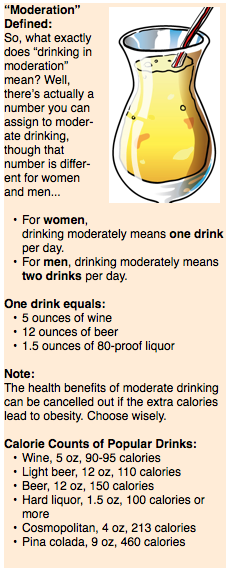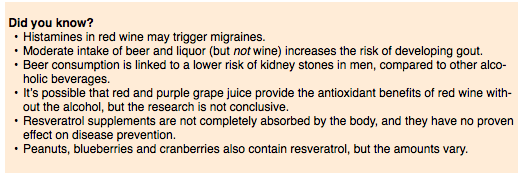Alcohol: Is Wine Really the Best?
Wine — especially red wine — is often touted as the heart-healthy beverage. After all, the French drink a lot of it, eat a diet high in saturated fat, and still have lower rates of heart disease, while the heart-healthy Mediterranean diet includes red wine in moderation. That said, news reports about wine, alcohol, and your health can be confusing! Let’s take a closer look at wine and its benefits. Potential Health Benefits:Moderate intake of wine, as well as beer and liquor, increases overall life expectancy by decreasing your risk of heart disease, diabetes, high blood pressure, stroke, and some types of cancer. It may also help prevent Alzheimer’s disease, improve brain function in the elderly, and help prevent gallstones.How Much:Health professionals are wary about telling people to drink up. Remember, the key here is moderation. That means an average of one drink/day for women and two drinks/day for men.How it Works:Wine, beer and liquor contain polyphenols, antioxidants that could protect the heart. Another antioxidant, resveratrol, is abundant in red wine, but not in beer and liquor. These phytochemicals get a lot of press, but the stronger evidence points to the alcohol (or ethanol) content as the reason for wine’s health benefits, making it equal to beer and liquor in fighting certain diseases, when consumed in moderation. Ethanol has been shown to increase “good” HDL cholesterol, decrease “bad” LDL cholesterol and reduce blood clots.Risks from Heavy Drinking:Excessive alcohol consumption and binge drinking is dangerous. Heavy drinkers are at high risk for heart failure, stroke, high blood pressure, liver disease, dementia, obesity and breast cancer. They also suffer from more violence, drowning, falls, suicide, car crashes and work-related accidents. Too much alcohol decreases life expectancy.Final Warning: If you drink, do so only in moderation. If you do not currently drink, alcohol’s health benefits should not be a reason to start. Of course, some people should not consume alcohol at all:
Potential Health Benefits:Moderate intake of wine, as well as beer and liquor, increases overall life expectancy by decreasing your risk of heart disease, diabetes, high blood pressure, stroke, and some types of cancer. It may also help prevent Alzheimer’s disease, improve brain function in the elderly, and help prevent gallstones.How Much:Health professionals are wary about telling people to drink up. Remember, the key here is moderation. That means an average of one drink/day for women and two drinks/day for men.How it Works:Wine, beer and liquor contain polyphenols, antioxidants that could protect the heart. Another antioxidant, resveratrol, is abundant in red wine, but not in beer and liquor. These phytochemicals get a lot of press, but the stronger evidence points to the alcohol (or ethanol) content as the reason for wine’s health benefits, making it equal to beer and liquor in fighting certain diseases, when consumed in moderation. Ethanol has been shown to increase “good” HDL cholesterol, decrease “bad” LDL cholesterol and reduce blood clots.Risks from Heavy Drinking:Excessive alcohol consumption and binge drinking is dangerous. Heavy drinkers are at high risk for heart failure, stroke, high blood pressure, liver disease, dementia, obesity and breast cancer. They also suffer from more violence, drowning, falls, suicide, car crashes and work-related accidents. Too much alcohol decreases life expectancy.Final Warning: If you drink, do so only in moderation. If you do not currently drink, alcohol’s health benefits should not be a reason to start. Of course, some people should not consume alcohol at all:
- Women who are pregnant or nursing, or taking estrogen
- People with certain medical conditions, such as liver disease, heart failure and pancreatitis.
- People taking certain medications and supplements (check labels and talk to your pharmacist).
- Those with a family history of alcoholism.
 By Hollis Bass, MEd, RD, LD
By Hollis Bass, MEd, RD, LD


